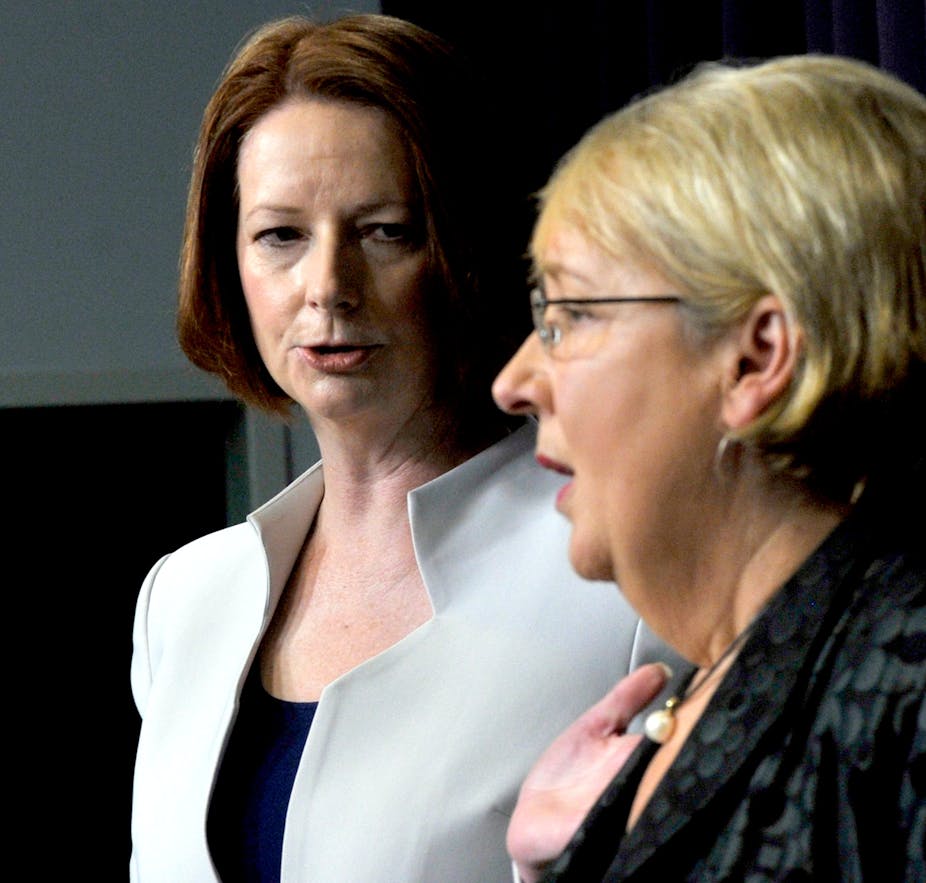The federal government’s consultation process on the next phase of the “Intervention” in the Northern Territory is excluding those to whom it matters most: Indigenous communities.
The “Intervention” was a contentious policy introduced in the dying days of the Howard government and continued (with some modifications) under prime ministers Rudd and Gillard and Minister Jenny Macklin. It targeted Aboriginal communities in the Northern Territory
Nearly two weeks ago Macklin released a discussion paper titled “Stronger Futures in the Northern Territory” allegedly written to inform the consultation process.
What a shame, then that the timing of the consultation process and the release of the paper repeats past mistakes that have undermined Indigenous confidence in government policy making.
Yet again, it is Aboriginal and Torres Strait Islander people who are expected to be flexible and accommodating of a government timeframe.
As Macklin herself notes in an opinion piece timed to coincide with the release of the paper, she does not want to replicate the “anger, fear and distrust among Indigenous people” brought about by the lack of consultation before the first wave of the Intervention.
Ploughing on regardless
The Rudd Government’s 2008 review of the first 12 months of the Intervention confirmed that the top down paternalism of the original approach had undermined many potentially valuable aspects of the policy.
The review report’s authors argued that the government needed to “reset their relationship with Aboriginal people based on genuine consultation, engagement and partnership.” Jenny Macklin has struggled with this challenge.
In 2009, in an effort to reinstate the Racial Discrimination Act (RDA), which had been suspended in order to deliver discriminatory aspects of the original Intervention policy, Macklin’s department conducted a series of “consultations.” They were intended to see some of these same discriminatory provisions recast as “special measures” under the Act.
The RDA requires that affected groups in the community be consulted and agree to “special measures” if they are to be granted as an exception to the Act.
Perhaps unsurprisingly, the government bureaucrats duly reported that, yes, the affected communities had agreed during these meetings that measures such as alcohol restrictions and bans on pornography should continue, allowing the government to reinstate the RDA.
Denying communities a voice
A different story about that consultation process emerged in the report “Will they be heard?”, in which authors including former Chief Justice of the Family Court, Alastair Nicholson and Indigenous legal academic Larissa Behrendt reviewed video footage of the 2009 consultation process.
The report was highly critical of these meetings, arguing that they could not really be called consultation in any meaningful sense of the word.
They found it problematic that Commonwealth bureaucrats had conducted the meetings rather than independent consultants, and that there had been very limited interpretation services available.
They also found that in the three recorded meetings available for review, Aboriginal people spoke very eloquently and critically about the stigmatising and discriminatory aspects of the Intervention policy.
Lack of consultation
Given these not insignificant issues raised in 2009, it is troubling that the new discussion paper repeats these mistakes and raises the same concerns.
The 28-page paper was released on 22 June. It is only available in English.
Consultations began just six – yes, six – days later and will last for just six weeks.
A media release from former prime minister Malcolm Fraser—part of the “Concerned Australians” group (as am I) —questions the “unseemly haste” of this process.
Surely an informed and genuine consultation process should begin with a discussion paper available in relevant community languages released sufficiently far in advance for all interested people in affected communities to have the opportunity to read, reflect and consider their response.
Conciliatory approaches from Indigenous people
Contrast this approach with the tireless efforts of Indigenous people in Australia to engage with governments over many, many decades.
Think, for example, of the 1963 bark petitions from the Yolngu people of northeast Arnhem Land protesting the excision of 300 square kilometres of their land to be leased to a bauxite mining company.
The typed text of the petitions, in both English and Gumatj languages, was framed by paintings of sacred clan designs communicating ancestral narratives of creation and of the land and sea estates of the Yolngu.
The petitions were a deliberate and innovative effort at bicultural political communication. They were neither the first nor the last of such efforts, but are indicative of an asymmetrical relationship wherein the innovation, accommodation and sheer hard work has primarily been undertaken by Indigenous people rather than the settler state.
One-sided compromise
Mainstream Australia invests significant energy in debate and discussion about contemporary Indigenous affairs.
But consistent Indigenous efforts to engage with government and to reach a wider audience are often missed in the process.
By definition, Indigenous efforts represent a form of compromise on the part of Aboriginal people, prepared to accept the presence of the interlopers on their land while working through what are often perceived by them as flawed European political notions and institutions. Where is the reciprocal movement from the state?
A new round of consultation, aimed not at manufacturing consent but at genuine dialogue and negotiation, could revitalise the struggling relationship between Aboriginal and Torres Strait Islander people and government. It is a shame that this opportunity is being missed – again.
Unsettling the Settler State, edited by Sarah Maddison and Morgan Brigg, will be launched by Tom Calma at the Australian Social Policy Conference tomorrow.

